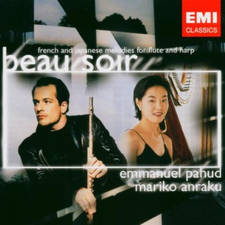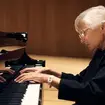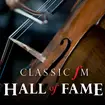Stroke survivors singing together in this London-based choir shows the power of music
13 September 2019, 11:40
When Manuela Gouveia’s family were affected by stroke, she felt inspired to set up a choir that would help survivors through song – and this heartwarming video proves that music heals.
In the UK, more than 100,000 people will have a stroke each year – that’s around one stroke every five minutes.
A stroke occurs when the blood supply to part of the brain has been restricted, and it can happen to anyone at any time.
While the effects of stroke are often devastating, there are currently more than 1.2 million survivors across the country – and music has been proven to have a positive impact on rehabilitation.
We caught up with Manuela Gouveia, founder of the London Stroke Choir, to find out more about how music and singing can be a lifeline to those affected.
What inspired you to set up the London Stroke Choir?
When my mother had a stroke in 2002, everything changed and sadly she passed away a few years later from vascular dementia. My dad, who is now 84, also had a TIA (or transient ischemic attack, sometimes known as a mini-stroke) but mercifully, it wasn’t as bad as my mum’s and he’s still with us today.
These experiences led me to start working as a stroke network coordinator at DASL, a disabled people’s organisation. My aim was to engage stroke survivors and encourage them to take part in activities that would improve their confidence and wellbeing, as well as reduce any feelings of isolation and depression.
In 2013, we set up the London Stroke Choir following a number of requests from the group of people I had been working with – and because I was a member of a community choir, I knew how beneficial singing had been on my personal wellbeing while living with the effects of my mother’s stroke. I had quite a lot of experience in marketing and arranging performances too, so it felt like a good time to set up the choir.
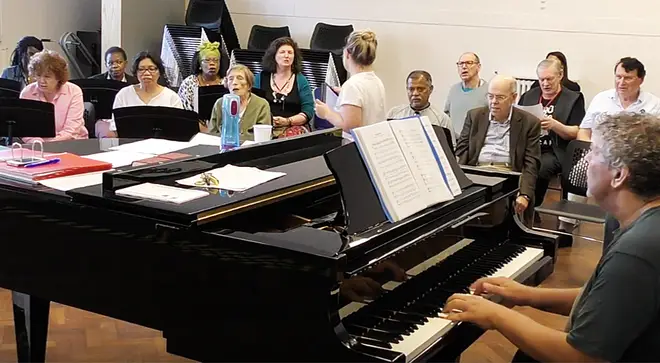
What are the benefits of singing in the Stroke Choir?
After suffering a stroke, survivors are often left feeling isolated and depressed because they have to adjust to a whole new way of life. There are a lot of limitations for them, whereas before they may have been able to do everything for themselves. They also lose many of their friendships because people don’t have the patience to wait around for them – they often can’t walk quickly (or even at all), and they can’t get their words out.
The London Stroke Choir is a place where survivors can come together. Everyone is in the same boat, nobody is judging them and they can support each other. And the benefits of singing are well documented in terms of the impact it has on our wellbeing, so for stroke survivors, this is especially important. Some members have also said their general confidence has improved since joining, and others have said their speech has improved.
We have a lady who is in her late forties who had a stroke when she was around 30. She can’t speak much, but I sit in front of her and can hear her sing. It’s really wonderful to know that she can express herself through music.
What music do you sing?
We cover all kinds of music, but it also depends on the teacher, what the choir is most interested in learning, and what each group is able to manage.
Last year, we tackled ‘This is Me’ from The Greatest Showman. Not an easy piece, but we did really well! We’ve also taught Otis Redding’s ‘Sitting on the Dock of the Bay’ and Ray Charles’ ‘Hit the Road Jack’.
Older tunes often go down well, like Vera Lynn’s ‘A Nightingale Sang in Berkeley Square’, Ella Fitzgerald’s ‘Lullaby of Birdland’, and ‘Lovely London Sky’ (from the second Mary Poppins movie). Just a real mixture. And of course, we sing Christmas carols for our festive performances.

London Stroke Choir 2017
Who else is involved?
The London Stroke Choir has been completely funded by donations and small grants made to DASL (Disability Advice Service Lambeth), and I organise and manage all aspects of the choir – including sourcing and liaising with the tutor, who is currently an amazing Aussie teacher, Merrilyn Greer!
We also have a wonderful pianist, John Polenski, who has helped us immensely because it means the tutor can focus on teaching the group instead of trying to play and teach at the same time. John is a volunteer and we are so grateful to have him support us.
Morley College have been instrumental in making this happen as they give us the space to rehearse for free, and I think it’s fair to say that if we had to pay for the rehearsal space, we probably wouldn’t have been able to carry on for this long.
I attend all rehearsals – which take place every Monday afternoon during “term time” – to provide support to the teacher and our members, who I contact before each session to remind them to come along on the following day. It’s important to do this because many survivors have poor memories after their stroke.
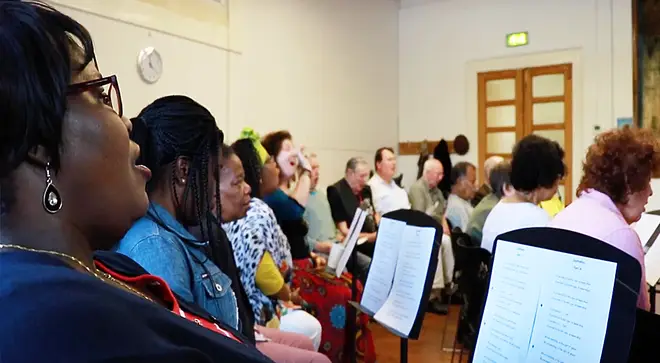
What is your approach to teaching?
We start each rehearsal by doing some body warm ups while sitting down, to loosen everyone up. Then, we spend quite a bit of time doing vocal exercises, and making different sounds to get the facial muscles working before moving on to the singing.
We’ll often sing rounds (where the choir is divided into three sections), and they tend to be simple melodies that people can remember easily. By listening to each other, it helps them learn – and it’s also very rewarding when each part finishes on time as it gives everyone that feeling of having achieved something!
When we start a new piece, we usually teach it line by line – but first, we say the words a few times. There’s a lot of repetition, which can be a little boring for some of the more able members, but they understand that some people may have more difficulty than others, and are very patient.
How do stroke survivors respond during rehearsals?
Music and singing seems to bring out a lot of emotion in stroke survivors. After my mum’s stroke, I remember playing her a CD by Andrea Bocelli. It was all sung in Italian, which she didn’t understand (we are Portuguese, and after her stroke she lost the basic English that she used to know), but as the music played she became quite tearful.
I’ve seen the same thing happen to many of our choir members. There was a youngish chap in his late 40s who used to well up whenever we sang ‘Follow The Heron’ – it’s a beautiful song and seems to evoke emotion when sung well. Another lady in her 50s joined us, but she couldn’t cope with being surrounded by sound and left after a few sessions. Sometimes, people aren’t ready to come to something like this when their stroke has been fairly recent, and need more time to come to terms with its effects.
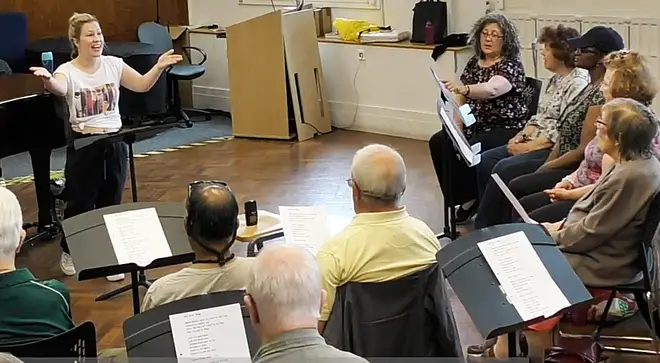
Have there been any musical highlights?
In 2014, we sang in the foyer at Royal Festival Hall – it was a great experience! We also performed for the Stroke Association’s annual fundraiser at Holy Trinity Church in the same year. And then in 2017, I worked on a project called Stroke Odysseys, where the choir were involved in a wonderful play at the V&A called ‘The Hospital Passion Play’. Some members even performed solos and Lil Sullivan sang a song that she wrote!
Another musical highlight was our Christmas 2017 recital at UCL, which has been kind enough to raise money for us. The concert was arranged by the university’s speech and language therapy students, and involved other inspirational choirs – including one that signs!
What does the future hold for the London Stroke Choir?
Thanks to the Co-op, we have enough funds to last us until Christmas – and that has been a real blessing.
As far as I’m aware, we’re one of the few choirs open to stroke survivors based in London, so it’s really crucial that we continue to find the funds to stay running. For them, the benefits of singing in a choir are truly invaluable.
To find out more about the London Stroke Choir, email Manuela, or visit the DASL website.
